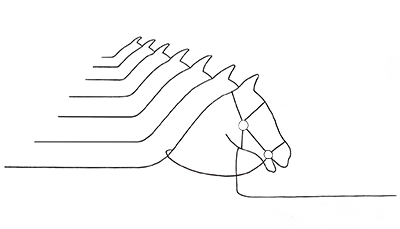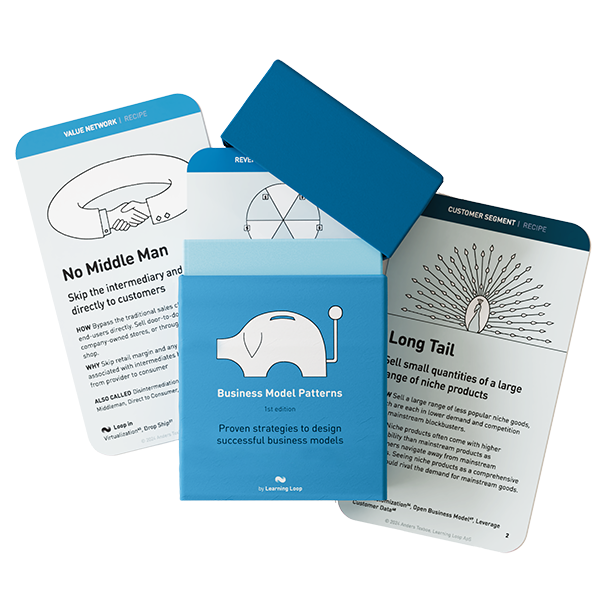Business Model Generation: Pricing model
Access over Ownership
Maximize efficiency with flexible product usage

How: The customer buys a right to access a product rather than owning it.
Why: Lower capital needed to gain access to a product in return for higher business profits. Higher utilization efficiency is achieved for both customer and business.
An access-based business model involves paying to use something rather than to own it. Examples of this include car leasing and ride-sharing for consumers, and leasing heavy machinery or office furniture and lighting for businesses. These models often have environmental advantages as they encourage reduced consumption and the reuse and recycling of goods.
For example, a car manufacturer might lease stainless steel sheets from a supplier to form the tubes for a chassis, rather than owning the sheets outright. The supplier retains ownership of the semi-finished goods, incentivizing them to offer materials that are more efficient, durable, and easier to recover at the end of a product’s life. This model also encourages product manufacturers to design for longer lifespan, minimal materials use, and ease of disassembly to facilitate repair and enhance the purity of recycled materials.
The access model could also be applied to raw materials, such as a mining company selling the right to use and process iron ore to a steel producer without giving up ownership of the material. This would require infrastructure to intercept, separate, sort, and recover materials to fulfil contractual obligations to return them to the supplier. Techniques that make materials digitally traceable will be especially important in this model.
Shifting toward more sustainble business models
The paradigm of access over ownership is fundamentally altering the way in which we consume finished goods. No longer are individuals beholden to the traditional model of purchasing products outright; rather, they are able to obtain access to said goods on a temporary basis.
This shift towards access-based consumption has the potential to mitigate a number of pressing ecological issues, such as resource depletion and waste generation. By purchasing access instead of products, the act of consumption becomes inherently more sustainable. This is due to the built-in incentives to reduce consumption and return goods for reuse and recycling, as opposed to the conventional linear model of consumption.
Car Sharing as a Prime Example
One prime example of this shift towards access-based consumption can be seen in the realm of car sharing. Studies have shown that individuals who partake in car sharing own 30% fewer cars than they did prior to their involvement in the car sharing economy.
This reduction in car ownership not only minimizes the environmental and economic costs associated with manufacturing and consumption, but it also highlights the true potential of access-based business models to address pressing environmental challenges.
The Slow Adoption of Access-based Models
Despite being recognized as economically and academically viable, access-based business models have been slow to gain traction in the marketplace. The application of these models is predominantly limited to finished goods, and thus represents only a fraction of the potential impact they could have on the overall consumption landscape.
Real life Access over Ownership examples
Spotify
On Spotify, users are not able to purchase individual songs or albums. Rather, they can access all songs on the platform by paying a flat monthly fee. This membership model allows for more flexible music consumption for customers, as they do not need to make individual purchases in order to access specific content.
Zipcar
Zipcar is a car-sharing service that allows customers to access a car without owning one. Zipcar owns and maintains a fleet of vehicles that are available to rent in cities across North America, Europe, and Asia. This model allows customers to have access to a car when they need it without the commitment and expense of owning one, and it also helps to reduce the number of cars on the road, which can help to improve air quality and reduce traffic congestion.
Trigger Questions
- Is ownership important to customers, or are they happy just using your product?
- Can you maintain a sustainable cash flow through financing?
- What products might we consider offering on a access or rental basis rather than selling outright to customers?
- How might offering rental options add value for our customers?
Proven business models that have driven success for global leaders across industries. Rethink how your business can create, deliver, and capture value.
Get your deck!Related plays
- Business Model Navigator by Karolin Frankenberger and Oliver Gassmann
- Access over Ownership: Sharing Economy & Smart Access
- Access beats ownership in radical new business models by Ian Mundell
- What is an access-based business model and how can it tackle waste and protect resources? by Marco Aurisicchio, Anouk Zeeuw van der Laan, Graham Aid, and Lars Nybom
